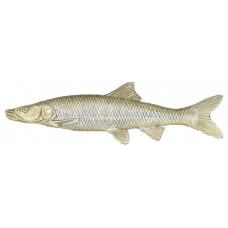Latin name
Ptychocheilus oregonensis
Other names
Squawfish, Columbia River dace, Columbia squawfish; French: sauvagesse du nord.
Identification
The mouth of the northern squawfish is terminal and large, extending backward beyond the anterior margin of the eye. The head is somewhat conical and flattened between the eyes, and the body is slender and barely compressed. All fins are transparent, without spots or coloration, with 9-10 rays in the dorsal fin and 8 rays in the anal fin. The tail fin is deeply forked. Coloration is usually dark green or greenish brown on top and lighter, often silvery, on the sides, belly whitish. The spawning male becomes yellowish or yellow-orange and has tubercles on the head, back and some fins.
Distribution
Northern squawfish are found in North America in the Pacific drainages from the Nass River in British Columbia to the Columbia River in Nevada, in the Harney River Basin in Oregon, and in the Peace River system (Arctic Basin) in British Columbia and Alberta.
Habitat
Northern squawfish live in lakes, ponds, and channels of small and large rivers.
Size
This species lives 10 years and can grow up to 25 inches, although some reports say it reaches 3 to 4 feet in length. Normal sizes range from 7 to 10 inches.
Life history and Behavior
No information
Food and feeding habits
The diet of northern squawfish consists of terrestrial insects, aquatic insect larvae, plankton, crustaceans, small fish, and fish eggs. The large individuals prey primarily on small fish and are considered serious predators of juvenile salmonids. In the Columbia River, fishery managers are attempting to control northern squawfish numbers to minimize this problem.
Reproduction
No information
| Classification | |
| Phylum | Chordata |
| Class | Actinopterygii |
| Squad | Cypriniformes |
| Family | Cyprinidae |
| Genus | Ptychocheilus |
| Species | P. oregonensis |
| Features | |
| Conservation status | Least Concern |
| Habitat | Pelagic |
| Life span, years | 11 |
| Maximum body weight, kg | 6.8 |
| Maximum length, cm | 182.88 |
| Sailing speed, m/s | No information |
| Threat to people | Edible |
| Way of eating | Predator |

